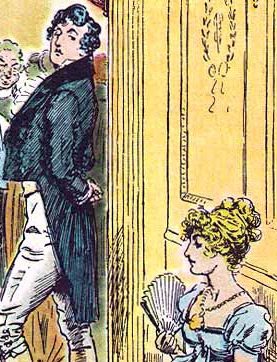
(Wikimedia Commons public domain)
1 Nephi 7, my Book of Mormon reading material for today, lacks any and all traces of romantic love. Lehi’s sons are dispatched to persuade Ishmael and his family to join them on their journey to the New World, and a brief account is given of the negotiations.
That’s not to say that ancient men and women didn’t feel romantic attraction. I can’t imagine that people have changed that much, and, anyway, there’s plenty of evidence for such attraction in ancient literature. (I can’t help but wonder whether the daughter of Ishmael who comes to Nephi’s aid in 1 Nephi 7:19 is the one he married.)
But the social structures of the ancient world — and, still today, in much of the world (including the Middle East) — are often quite frankly unromantic with regard to marriage. Heirs are needed. Children are required to work the farm and support you in your old age. For royal families, healthy breeding stock was required, lest the nation be plunged into a crisis. Hence, arranged marriages. (Love, if it ever comes, must come later.) The calculations can often seem to us rather crassly materialistic and not at all what Hollywood and pop music have taught us to expect.
Jane Austen’s wonderful novels clearly show a clash between newly assertive romanticism (and newly assertive women, perhaps) and the old straightforward commercialism of a marriage transaction that still existed in the upper classes of England during the early 1800s. (Jane herself never married, and her own relatively unpromising economic situation was surely a major factor in that.) In Pride and Prejudice, the Bennet girls must be married off in order to secure them a living; it would be preferable if one might marry the wretched Mr. Collins, on whom the Bennet estate is entailed; Mr. Bingley is a prize catch because he’s affable but also because he receives four to five thousand pounds per year. And so forth.
Here’s Mrs. Bennet in Volume 3 of Pride and Prejudice, Chapter 17: “Dear, dear Lizzy. A house in town! Every thing that is charming! Three daughters married! Ten thousand a year! Oh, Lord! What will become of me. I shall go distracted.”
Joseph Smith, by contrast, came of the lower classes in frontier America, where status was far less important and economic position far more fluid than in Regency England.
If there had been any trace of romantic love in the Book of Mormon — any parallel to Joseph’s clearly romantic elopement with Emma, for example — it would have been a fairly obvious mark, to my mind at least, of modern composition.
This needs further thinking through. But it’s one of the things that occurred to me upon opening up 1 Nephi 7 this morning.











